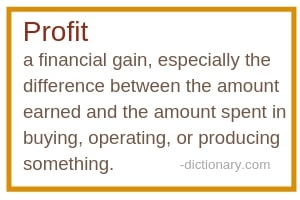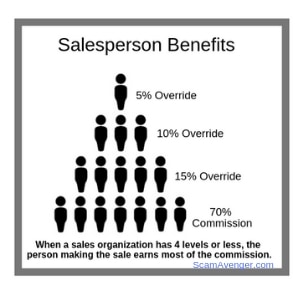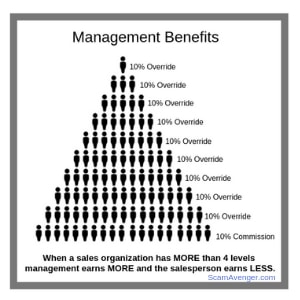When someone tries to sell you an opportunity, it probably isn’t an opportunity at all. In this article, I show you how to evaluate an MLM company and determine if their opportunity is genuine.
How to Evaluate an MLM Company. A genuine MLM company offers the opportunity to succeed through retail sales, not through sales to distributors in their downline. According to the FTC, when distributors earn most of their revenue from sales to their downline, most distributors will lose money.
Click to DISCOVER a Proven Path to Financial Independence!
How to Evaluate an MLM Company.
 If you are looking at an MLM opportunity as a chance to make money, you must think like a business person.
If you are looking at an MLM opportunity as a chance to make money, you must think like a business person.
Joining an MLM is a business decision. Your time, money and energy are at risk. You cannot afford to let emotions influence you.
As much as humanly possible, you must determine up front how much the opportunity will cost you and how much you can expect to earn. And, you must have a plan.
Most people join an MLM because they want to make money. Unfortunately, most discover too late that the opportunity costs them more than they earn.
Three things you must know before you join an MLM;
- How much will it cost to join?
- How much will it cost each month?
- How much are most distributors earning?
More Questions.
How will you succeed with the opportunity? Is it possible? Can you do it? How long can you sustain the business at a loss before it is profitable?
Proper Due Diligence is Essential.
In the course of reading this article, you will be led through a series of questions. Find the answers in writing, preferably published on the MLM website.
Please do not rely on anything someone tells you. Conversations, either over the phone, on Skype or in person, are not regulated by the FTC. And legal recourse is expensive. It is better to avoid harm than to try to recover from it later.
By the time you finish reading this article, you will know how to evaluate an MLM opportunity, determine your odds of success, and what it will take to be a top earner.
An MLM by Any Other Name.
In this text, I use the term MLM, aka Multi-level Marketing, to represent any company that promotes an opportunity to succeed through building a  multi-level sales organization.
multi-level sales organization.
Instead of using the term MLM, some companies prefer to describe themselves as direct sales companies or network marketing companies.
These companies can get quite testy about what they are called too. I’ve gotten letters from lawyers claiming I defamed their client’s company by referring to it as an MLM when it is a Direct Sales company.
A rose by any other name is still a rose.
Pyramids, MLMs and Recruiting.
I suspect it is because pyramid schemes often pretend to be MLMs that they are so testy about what they are called. Also, MLM and Networking Marketing have awful reputations, and for a good reason, as you’ll see.
Another term MLMs like to dodge is “recruiting.” Most will pretend that they get their recruits through other means.
Recruiting is a bad word for MLMs because, according to the FTC, if an MLM is dependent on recruiting, it may be a pyramid scheme.
How to Spot a Pyramid Scheme.
A Thin and Blurry Line.
If you have been approached by someone trying to recruit you into an opportunity, it’s probably structured like an MLM, or worse, a pyramid scheme. In fact, the line between a proper MLM and an illegal pyramid scheme if often blurry and razor thin. Therein lies the danger.
Remember, just because an MLM is not a pyramid scheme does not mean it’s a good opportunity. Most MLMs have a dismal earning record and most people who try MLM lose money.
Click to DISCOVER a Proven Path to Financial Independence!
Earnings vs. Profit.
Before we go too far down the MLM Opportunity rabbit hole, it’s important to clarify the difference between earnings and profit, because some unethical MLMs like to hide behind the confusion between the two.
Within the context of this article, “earnings” is all the money an MLM pays a distributor, such as commissions and bonuses.
 Earnings do not account for the cost of doing business such as buying products, business expenses, and self-employment taxes.
Earnings do not account for the cost of doing business such as buying products, business expenses, and self-employment taxes.
When an MLM reports how much their distributors earn, it is before the cost of products and business expenses are factored in.
Profit is another kettle of fish. Profit is what is left after the cost of doing business is subtracted from earnings. Not surprisingly, it usually a much smaller number.
MLMs do not report on the profit of their distributors, but we can use other factors to get a good enough idea about the profit you can expect to make with a legitimate MLM. More on that in a moment.
Why Pay for an Opportunity?
Now that we have the earnings vs. profit question out of the way let’s look at what the opportunity will cost you.
MLM is the only industry that I know that demands people pay them for the privilege of making money for the company.
The fee for joining the company will probably be explained as a Starter Pack or Business Pack, or something like that. It usually includes some business information and products.
The bottom line about the Starter Pack is money will flow out of your pocket and into the pocket of someone else.
Is it Really an Opportunity?
If you must pay for the opportunity, is it really an opportunity?
There are thousands of companies that will gladly pay YOU to sell their products. This is but one reason I recommend affiliate marketing over MLM.
Read Why Affiliate Marketing is Better than MLM.
Paying for the opportunity to make money for an MLM is like Tom Sawyer tricking his buddies into paying him for the privilege of whitewashing the fence.
Before committing to an MLM company, be sure you understand what it will cost you.
Beware of Frontloading.
Also, be aware that some MLM companies will exploit the “buy the opportunity” requirement even more.
Some unethical MLM companies will encourage frontloading recruits with tons of products. New distributors are pressured to buy as much product as they can afford to put on their credit card.
 The MLM will justify frontloading. Often frontloading is sold as a way to make very large bonuses.
The MLM will justify frontloading. Often frontloading is sold as a way to make very large bonuses.
For example, an MLM I’m familiar with has a $2,000 product package. If a distributor sells the $2,000 product package, he earns a $500 bonus. However, to qualify for the bonus, the distributor must first BUY the $2,000 product package.
This same company that promotes the $2,000 product package does not buy back inventory. Once a distributor buys the package, they own it!
Does the MLM Have True Retail Sales?
It is essential that most of the revenue earned by an MLM is from retail sales to the public and there is consumer demand for the product.
When most of the revenue is generated through retail sales, the MLM is probably not a pyramid scheme. And, when there is a legitimate consumer demand for the products, a distributor could probably earn a profit without recruiting a sales force.
Unfortunately, many MLMs do not offer products that serve to fulfill genuine consumer demand. Many MLMs earn most of their revenue by forcing distributors to buy products in order to earn commissions and bonuses.
Does the MLM Force Distributors to Buy Products?
When distributors are forced to buy products, recruiting new distributors appears to be the best way to make money.
However, while the payment structure appears to reward recruitment, the dynamics of the business model make earning a profit almost impossible.
When distributors are forced to buy products to qualify, they find themselves on a hamster wheel of always spending more than they earn and never getting ahead.
Also, when distributors are forced to buy product each month in order to stay qualified, they often end up spending thousands of dollars each year. In the beginning, had they known the “opportunity” would have cost them so much they probably would have never joined the MLM.
Is the MLM Dependent on Recruitment?
An organization that is dependent on recruiting is inherently unstable. When recruiting stops, the organization begins to crumble.
 Pyramid schemes are dependent on recruitment. An MLM that is dependent on recruitment may be a product-based pyramid scheme as defined by Jon Taylor.
Pyramid schemes are dependent on recruitment. An MLM that is dependent on recruitment may be a product-based pyramid scheme as defined by Jon Taylor.
Building a business on recruitment is very difficult because people are always dropping out.
When success is dependent on recruiting, a distributor must be able to recruit more people into the organization faster than people are quitting.
Recruiting is a skill that is learned over time. Because most distributors lose money with MLM, they do not stay long enough to master recruitment.
If the MLM you are considering is dependent on recruitment, can you do it?
An organization that is dependent on recruitment favors the first few distributors who joined.
It also favors distributors who have influence over large numbers of people or who have internet marketing skills to feed large numbers of people into the recruiting hopper.
Must Distributors Qualify?
In addition to paying for the privilege of making money for the company, many MLMs also require distributors to buy a minimum number of products each month to qualify for commissions and bonuses.
Usually, the minimum qualifications are stated in code, such as PV, aka Personal Volume. I have never found the dollar equivalent of PV stated on the website of an MLM.
Apparently, MLMs don’t want the public to know how much a distributor must spend each month to stay qualified.
When in doubt, assume 1PV = $1. It is rarely less and often more.
However, determine the precise monthly expense of qualifying for the MLM you are evaluating.
Buying product each month to qualify will be a major recurring business expense. Be sure you understand what it will be for the MLM you are considering.
Like the starter fee an MLM charges for the privilege of selling the company’s products, monthly qualifying purchases continue the costly privilege.
No other industry expects its sales force to buy products each month to qualify.
Is the MLM a Member of DSA?
Some MLMs are members of the Direct Selling Association. The DSA is a national trade association of companies that distribute products directly to consumers.
 If the MLM you are considering is a member of DSA, they will have the DSA logo on their site. You can also go to the DSA website and search their database of members.
If the MLM you are considering is a member of DSA, they will have the DSA logo on their site. You can also go to the DSA website and search their database of members.
Most of the members of DSA are companies that are organized like MLMs and who rely on recruiting a sales force.
As a member of the DSA, an MLM must abide by a few rules that protect the consumer and the sales force. However, some of the members of DSA are less compliant than others.
If the MLM company you are thinking of joining is not a member of the DSA, I caution you not to join it.
If it is a member, it doesn’t mean you should join it either. DSA was created by MLMs for MLMs. However, when a company is a member, that company’s distributors have more recourse if they are cheated or mistreated.
When a company is a member of DSA, a distributor can appeal to DSA to arbitrate issues the distributor may have with the company.
The DSA requires that MLM members have in place a buy-back policy. This means if a new distributor buys more product than they can sell in the first year, the MLM will buy it back if certain conditions are met.
The buy-back policy is DSA’s effort to prevent members from profiting from frontloading recruits.
DSA also requires its members to post an Earning Disclosure on their website that shows how much each level of the sales force earns.
Sometimes the Earning Disclosure is called something else, such as Earning Disclaimer of Earning Statement. Whatever it is called, it is a record of how much distributors at all levels were paid by the company.
Before joining an MLM, you must read the Earning Disclosure. The Earning Disclosure will show you how much you can expect to earn.
Read the Earning Disclosure!
Remember, it is the Earning Disclosure and not the Compensation Plan that shows how much you can expect to earn with the MLM opportunity.

Unfortunately, because most distributors do not earn anything, MLM companies go to extreme measures to hide their Earning Disclosure or to distort the number to make it look better than it is.
The Earning Disclosure is often difficult to find. If a company does not have an Earning Disclosure or if you cannot find it, do not join the company.
It is impossible to conduct proper due diligence on an opportunity if you can not read and understand the Earning Disclosure.
A trick many MLM recruiters like to play is to direct a prospect’s attention away from the Earning Disclosure and toward the Compensation Plan. Don’t fall for that.
The Compensation Plan is hypothetical. It’s what a distributor MIGHT earn if he qualifies, jumps through all the right hoops and sticks around long enough.
The Earning Disclosure is real. It shows what distributors were actually paid by the company. I have never seen an MLM Earning Disclosure that was not dismal and heartbreaking.
Important Point: If you aren’t disappointed when you read the Earning Disclosure, you either aren’t reading it correctly, or you’re looking at the Compensation Plan.
If the Earning Disclosure gets you excited, you are definitely looking at the Compensation Plan.
The Earning Disclosure is not exciting. It’s depressing.
The Ugly Truth About MLM.
Before you can understand an MLM’s Earning Disclosure, you must first understand an ugly truth about MLM. Very few people in MLM earn more money than they spend to qualify each month.
MLMs have been around since the 1940s. There is a ton of data available about the industry, including tax records from millions of distributors.
Any way you look at it, the ugly truth about MLM cannot be avoided. According to documents published on the FTC website, most MLM distributors lose money. When I say most, I mean approximately 99% of all  distributors lose money.
distributors lose money.
Turn that number around, and you’ll see that only about 1% of all distributors earn more than they spend.
I can’t imagine any other so-called opportunity with such a pathetic rate of success.
A Closer Look at the Earning Disclosure.
Now that you know that only about 1% of distributors earn more than they spend, find the Earning Disclosure for the MLM you’re considering.
Sometimes you can find the Earning Disclosure by simply searching Google for the name of the MLM followed by “Earning Disclosure.”
At first, it might look like the distributors in your MLM of choice have a much higher percentage of success than the industry average. I doubt it.
To make their Earning Disclosure look more promising, most MLMs will play a few tricks to distort the truth.
First, they will not count distributors who did not earn anything.
80% Don’t Earn Anything.
Look in the text either above or below the Earnings Disclosure table. You might find where the MLM admits to not counting distributors who did not earn anything.
They might try to explain this away with statements like; “80% of our distributors only wanted to buy our fabulous products and did not work the business or did not qualify.”
Remember, it costs money to stay qualified each month and most people stop trying soon after they join an MLM.
In most Earning Disclosures I’ve seen, about 80% of the distributors did not earn anything.
The Earning Disclosure usually has a table that breaks down the percentages paid out to the distributors who did earn commissions and bonuses.
The information is presented to appear as if it represents all distributors. That is intentionally misleading.
Distorted Numbers.
Another trick many MLMs play to distort the numbers is to include the earnings for 18 months while making it look like only 12 months.
Also, remember that the payouts shown are earnings, not profits. The payout numbers do not account for the cost of products purchased each month to remain qualified, the cost of doing business or self-employment taxes.
When you factor in the cost of doing business, particularly the cost of buying products each month to remain qualified, you will see that only the top 1% or less is actually making a profit.
That 1% represents your probability of success.
The Compensation Plan?
As I mentioned earlier, the Compensation Plan is hypothetical. It is what might happen in a perfect world if a distributor successfully jumped through all the hoops and built a large sales force.
 The Compensation Plan serves only to perpetuate the illusion that the MLM is offering a legitimate opportunity when in fact the opportunity is almost non-existent.
The Compensation Plan serves only to perpetuate the illusion that the MLM is offering a legitimate opportunity when in fact the opportunity is almost non-existent.
Many MLMs recruit by selling the dream of financial independence, of escaping the 9 to 5 grind and living a comfortable, secure life with plenty of leisure time.
The Compensation Plan is the platform they use to sell that dream and to continually re-sell it to the distributors in the trenches.
Some people believe so completely that MLMs lead to financial freedom that when they fail, as they surely will, they blame that specific MLM. Then they go searching for another MLM that they believe can deliver on the promise and the cycle starts over.
It might be the fault of the MLM, but the industry is to blame too. Remember, only about 1% earn more than they spend on their MLM business. And, of those who are making a profit, very few are earning more than minimum wage.
Do You Understand the Compensation Plan?
I have yet to find a Compensation Plan that can be understood without the help of an upline distributor.
Remember, as you evaluate an MLM opportunity, you can only count on what is written and preferably what is published on the company’s website.
Anything someone tells you that is not also documented on the MLM’s website is meaningless.
I believe Compensation Plans are difficult to understand for several reasons. If the person who is trying to recruit you cannot explain the Compensation Plan, it opens the door for bringing in a more experienced recruiter to talk you into joining the MLM.
Also, the complexity of the typical Compensation Plan tends to shut down the rational mind. When we can’t understand something, our brain simply checks out.
Once our brain is out to lunch, only our emotions are available to make the decision. That rarely ends well.
Who Owns the MLM Company?
Now that we’ve established that very few distributors earn more than they spend on products to stay qualified. It makes sense to ask who owns the company?
If all those distributors are being forced to buy products each month, where is the money going? It’s going to the very top of the organization.
In typical fashion, only a few distributors at the very top of the organization make a substantial income. If the company is privately owned, you can imagine where most of the money goes.
When you realize that most of the money generated by forcing distributors to buy products goes to the owner and a few at the top, you have to wonder if the MLM business is structured intentionally to enrich the very few at the expense of the many.
Some of the wealthiest MLMs have been around for decades. None of them have adjusted their payment structure or qualifying requirements to improve the odds of success for the little guy.
Not a single one.
Are You Really a Customer?
 If an MLM is privately owned, it stands to reason that the owner created the company for her own benefit, not to help people make money.
If an MLM is privately owned, it stands to reason that the owner created the company for her own benefit, not to help people make money.
What Does the MLM Want from You?
Does the MLM want you to make money, or does it want you to buy products?
Are you a distributor? Or, are you really a customer dazzled by dreams of riches?
Does the MLM Use Emotion to Manipulate?
MLMs have a reputation for exciting meetings and a cult-like atmosphere. There’s a reason for this. Emotion sells.
If you take an unemotional look at MLM, the opportunity doesn’t seem so inviting. In fact, it might look like just another way to throw money away and waste your time.
However, if you add excitement and dreams of financial independence, then it looks like something special. That’s why MLMs use emotion.
There’s a reason we’re told never to make a business decision based on emotion. When we’re emotional, our logical brain turns to mush.
If an MLM can make you greedy for what they’re selling, you’ll probably hand over your cash. And, you’ll keep handing it over each month until you realize you’re not making money, you’re spending it.
That’s the power of emotional manipulation.
Early in the game, when you’re first considering the opportunity, ask yourself, is the MLM trying to manipulate your emotions?
Here’s the thing, if the opportunity is genuine, you’ll see it. If it’s not genuine, the MLM must resort to manipulation to get you to bite.
When looking at a business opportunity, it’s helpful to ask a friend who is more detached from the decision to check your reasoning.

Does the MLM Sell a Dream?
Most MLMs sell the dream of wealth, freedom and success in some form. That’s the emotional hook. If given a chance, they will hijack your personal dreams too, whatever they might be.
Let’s say you dream of acting in Hollywood; a skillful MLM recruiter will try to convince you that once you build your MLM business and are financially free, you can then afford to go to Hollywood and chase your dream.
Remember, when you’re under the emotional spell of believing the MLM will help you reach your dreams, you’re vulnerable.
Once a distributor buys into the dream and believes the MLM is the answer to a better life, they will purchase hundreds of dollars of over-priced products each month.
That is why MLMs sell the dream. There is no other way to sell over-priced products except to convince people that by spending money they will make money.
It’s insane when you look at it from the outside.
What are the Products?
Some MLMs offered everyday consumables, such as soaps and cleaning supplies. If the products can compete in quality and price with similar available products, it may be possible to build a retail business with the MLM.
 However, many MLMs promote some form of a magical product. It might be essential oils, CBD oil, instant coffee laced with mushroom powder or a health-promoting elixir.
However, many MLMs promote some form of a magical product. It might be essential oils, CBD oil, instant coffee laced with mushroom powder or a health-promoting elixir.
They may also make astounding claims of miraculous health improvements that are not substantiated by any medical or government agency.
The magical claims about the products are to get you excited about the opportunity and to justify charging outrageous prices. Often, these same MLM companies will have a very expensive starter package that they pressure new distributors to buy.
Starter packages of $2,000 to $5,000 are not uncommon.
Many of these MLMs will not buy back the products either, and distributors are left with a bedroom full of product they can’t sell and a credit card bill that will take months or years to pay off.
How bad is the Competition?
For every MLM product, there are competing MLMs selling the same thing and less expensive alternatives online and in the retail stores.
You can’t sell a product consistently if there are equal products available for less. Even a friend or family member will only over-pay for so long to help you out. Then, they’ll give it up.
Do You Like the Products?
Do you like the products enough that you would use them even if you knew you’d never make money with the opportunity?
If you wouldn’t use the products if they were not attached to a business opportunity, you probably should not get involved with the business.
How to Analyze the Competition.
 Here’s a quick and easy trick for analyzing the competition of an MLM product.
Here’s a quick and easy trick for analyzing the competition of an MLM product.
Search for the MLM product on Amazon. When you find it, Amazon will also recommend similar products.
Notice the difference in the prices between products sold by MLMs and products sold through traditional retail channels.
Is the MLM product priced to compete? Or are there alternatives that cost less?
Trying to sell over-priced products is difficult and discouraging.
Also, check eBay for the MLM product. If there is a lot of the same product on eBay, it might be because distributors were pressured to buy large and expensive starter packs and are trying to unload inventory.
How Many Levels?
How many levels are in the MLM? A genuine sales organization only needs 4 levels; local, regional, state and national.
However, many MLMs have far more than 4 levels. I’ve seen some with over 12 levels. More than 4 levels is artificial. It benefits the few at the top at the expense of the many.
Typically, an organization with more than 4 levels also pays about as much in commissions to the people at the top who did nothing to earn the sale as it pays to the distributor who made the sale.
 A very deep sales organization that pays commissions at every level benefits the few at the top at the expense of the many at the bottom.
A very deep sales organization that pays commissions at every level benefits the few at the top at the expense of the many at the bottom.
A sales organization with many levels has a very wide base feeding commissions to the few at the top.
When this structure is combined with forcing distributors to buy product each month to qualify, the entire organization becomes a giant funnel sucking money out of the pockets of the distributors and channeling it to the few at the top.
Your MLM Business Isn’t Yours.
And it’s not a business either.
Typically, an MLM will claim that as a distributor with their company, you will be in business for yourself, but not by yourself.
That sounds good, but it isn’t true.
Your MLM business is not a business. Legally, when you join an MLM, you are a contractual commission sales person and nothing more.
As an MLM distributor, you will not qualify for a business loan. SCORE, the United States largest network of volunteer expert business mentors, does not recognize an MLM distributorship as a business.
Your MLM business is not yours. Ultimately, when you build a sales force with an MLM, you are building THEIR sales force.
As an MLM distributor, you are dependent on the rules set forth by the MLM company. Essentially, you are spending your time, energy and treasure to build THEIR company.
Click to DISCOVER a Proven Path to Financial Independence!
What it Takes to Succeed with MLM.
 People who succeed with MLM first master recruiting, management and leadership. You might hear about an unskilled person who went from earning minimum wage to earning a million a year in MLM.
People who succeed with MLM first master recruiting, management and leadership. You might hear about an unskilled person who went from earning minimum wage to earning a million a year in MLM.
However, that person did not earn a million a year without skills. He mastered recruitment, management, and leadership.
And, no doubt, he funded his MLM business at a loss for years before it produced a positive cash flow. Most people can’t afford to do that.
MLM is dependent on recruitment. People who succeed with MLM recruit large numbers of people and understand that most will quit the first year.
Success with MLM requires the ability to talk people into spending money they don’t have on an opportunity that isn’t real.
Ask yourself, knowing that only about 1% profit with MLM and that most distributors are actually captured customers who lose money and quit, could you go into a person’s home and persuade them to join your company?
Related Articles:
Why Affiliate Marketing is Better than MLM.
If you found this article helpful, or if you have experience with MLM, Network Marketing or Direct Sales you would like to share, please leave a comment below. Thank you.
